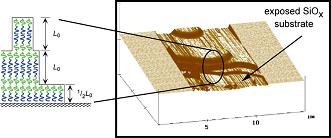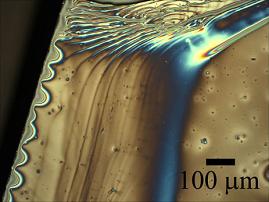Research Interests
- Functionalized polymers and block copolymers
- Nanoparticles
- Self-assembly
- Molecular recognition
The Research in the Shenhar Group

Block copolymers are made of two (or more) sequences of incompatible repeat units. Due to a unique process called microphase separation, these materials self-organize into nano-objects in solution and periodic nano-scale morphologies in the solid state. Block copolymers are thus highly promising for nanotechnology, with applications ranging from drug delivery carriers to ultra-high density lithographic masks.
While most research on block copolymers concentrates on polymers that consist of the most common monomers (e.g., styrenes, acrylates, and epoxides), the incorporation of tailor-made functionalities through synthetic chemistry has the potential of opening exciting new opportunities for these fascinating materials. The research will focus on the combination between block copolymer microphase separation and self-assembly through non-covalent interactions. Within this framework we will synthesize novel materials and study their properties, characterize their solid-state morphologies, investigate the interplay between different systems of interactions and its effect on material structure and behavior, and develop new synthetic routes to functional nano-objects and porous membranes.
Students in the group will develop a unique set of skills from different disciplines, from organic synthesis to advanced characterization techniques. Areas of specialization will include the utilization of controlled polymerization techniques as well as the preparation and characterization of polymer thin films. In addition to the standard characterization methods used in organic chemistry (e.g., NMR, UV-Vis, and IR spectroscopy), the research will employ advanced structure characterization techniques such as X-ray diffraction, electron microscopy (TEM and SEM), scanning probe microscopy (SPM) and optical microscopy.
ד"ר רועי שנהר - נושאי המחקר בקבוצה
- סינתזה ואפיון של בלוק-קופולימרים ייחודיים ומולקולות פונקציונליות ליצירת חומרים מתקדמים בעלי תכונות תלויות-מורפולוגיה
- פיתוח שיטות לארגון עצמי של חומר המבוססות על הפיסיקה של בלוק-קופולימרים וכימיה סופראמולקולרית
- אפיון יחסי תכונה-מבנה במערכות פולימריות בעלות מורפולוגיות ננומטריות
- פיתוח מערכות המבוססות על בלוק-קופולימרים ליישומי ננוטכנולוגיה

בלוק-קופולימרים הם פולימרים המורכבים משני רצפים (או יותר) של מונומרים שונים. תהליך הפרדת פאזות ייחודי המתרחש במערכות אלו מוביל ליצירה ספונטנית של מערכות מאורגנות הן בתמיסה (כעצמים בגודל ננומטרי) והן במוצק (כמורפולוגיות שונות בעלות מחזורים ננומטריים). עקב כך, בלוק-קופולימרים הם בעלי פוטנציאל גדול בתחום הננוטכנולוגיה, ויישומים הכוללים בלוק-קופולימרים משתרעים על פני תחומי מדע שונים, מביולוגיה ורפואה (כנשאי מולקולות בעלות אפקט פארמקולוגי) ועד למיקרואלקטרוניקה (כמסיכות ליתוגרפיה ליצירת מערכי עצמים בצפיפות גבוהה ביותר).
בעוד המחקר על בלוק-קופולימרים כיום מתרכז בעיקר בפולימרים המורכבים מהמונומרים הפשוטים ביותר (כדוגמת סטירנים, אקרילטים ואפוקסידים), שילוב של קבוצות פונקציונליות דרך סינתזה אורגנית הוא בעל פוטנציאל רב לפתוח אפשרויות מלהיבות לחומרים אלו. המחקר יתמקד על שילוב בין שיטות שונות ליצירת מבנים מאורגנים, בהתבסס על הפרדת הפאזות של בלוק-קופולימרים מחד ועל ארגון-עצמי (self-assembly) של מולקולות דרך אינטראקציות לא קוולנטיות מאידך. במסגרת זו ניצור חומרים חדשים ונחקור את תכונותיהם, נאפיין את המורפולוגיות שהם יוצרים במצב המוצק, נלמד על יחסי הגומלין בין מערכות אינטראקציות שונות והשפעתם על מבנה החומר והתנהגותו, ונפתח ערוצי סינתזה חדשים ליצירת עצמים בגדול ננומטרי וממברנות נקבוביות פונקציונליות.
סטודנטים בקבוצה ירכשו מיומנויות מחקר בתחומים שונים, מסינתזה אורגנית ועד לשיטות אפיון מתקדמות. שטחי התמחות יכללו יישום של שיטות לפולימריזציה מבוקרת וכן הכנה ואפיון של שכבות פולימריות דקות. בנוסף לשיטות האפיון המקובלות בכימיה אורגנית (תמ"ג, ספקטרוסקופיות UV-Vis ו-IR), יהיה שימוש נרחב בשיטות אפיון מבנה מתקדמות כגון פיזור קרני X, מיקרוסקופיה אלקטרונית (TEM ו-SEM), מיקרוסקופיית כוח אטומי (AFM), ומיקרוסקופיה אופטית.